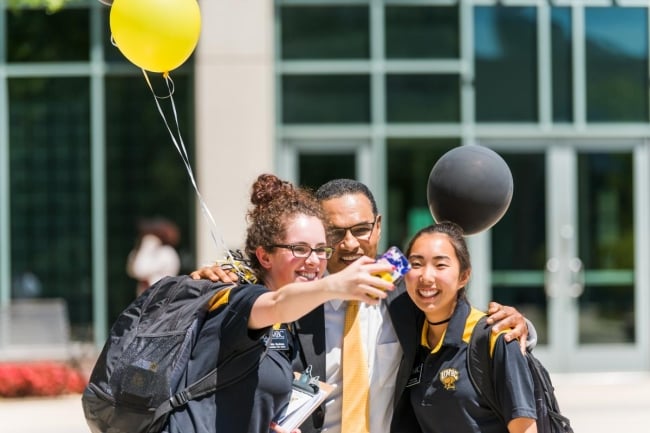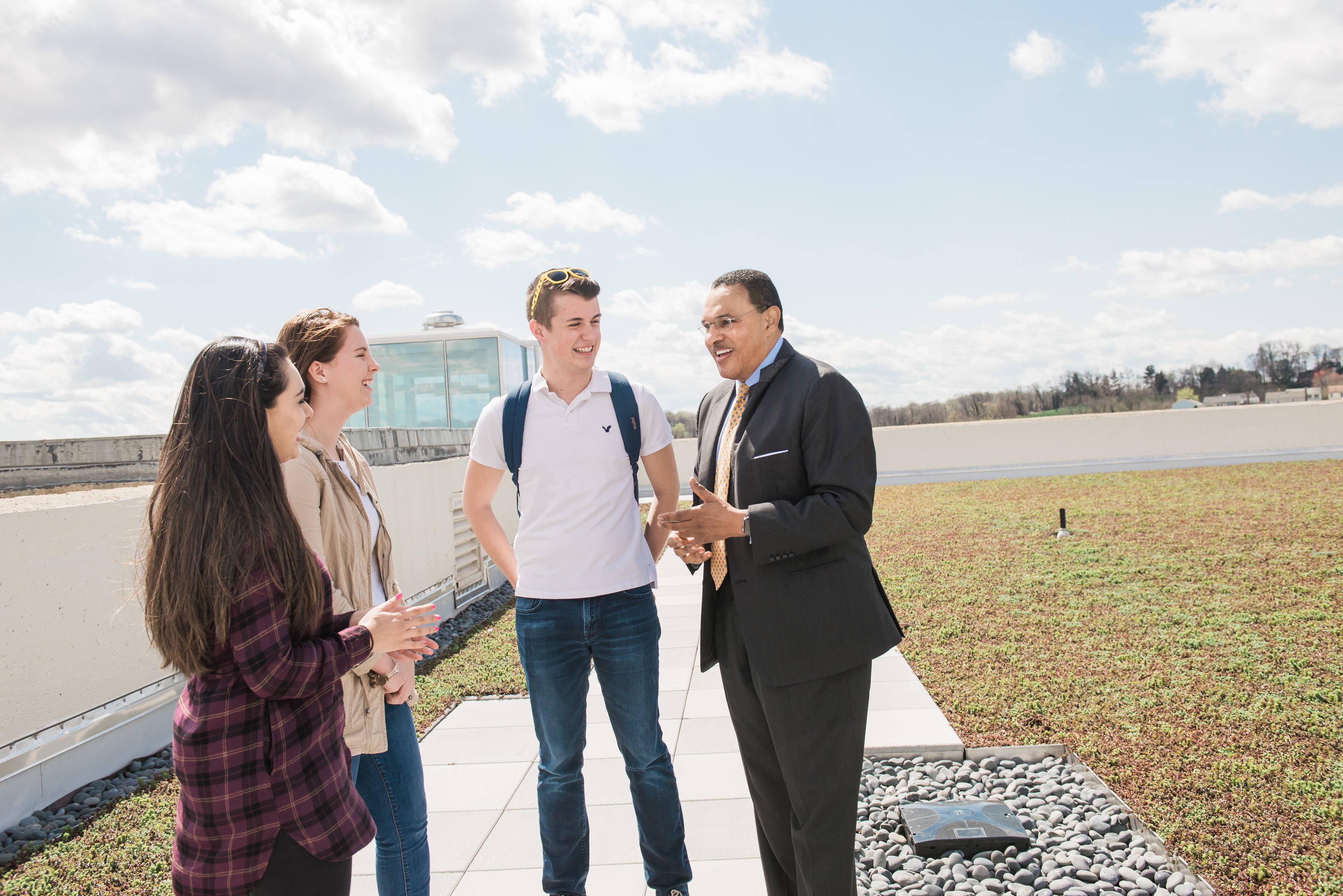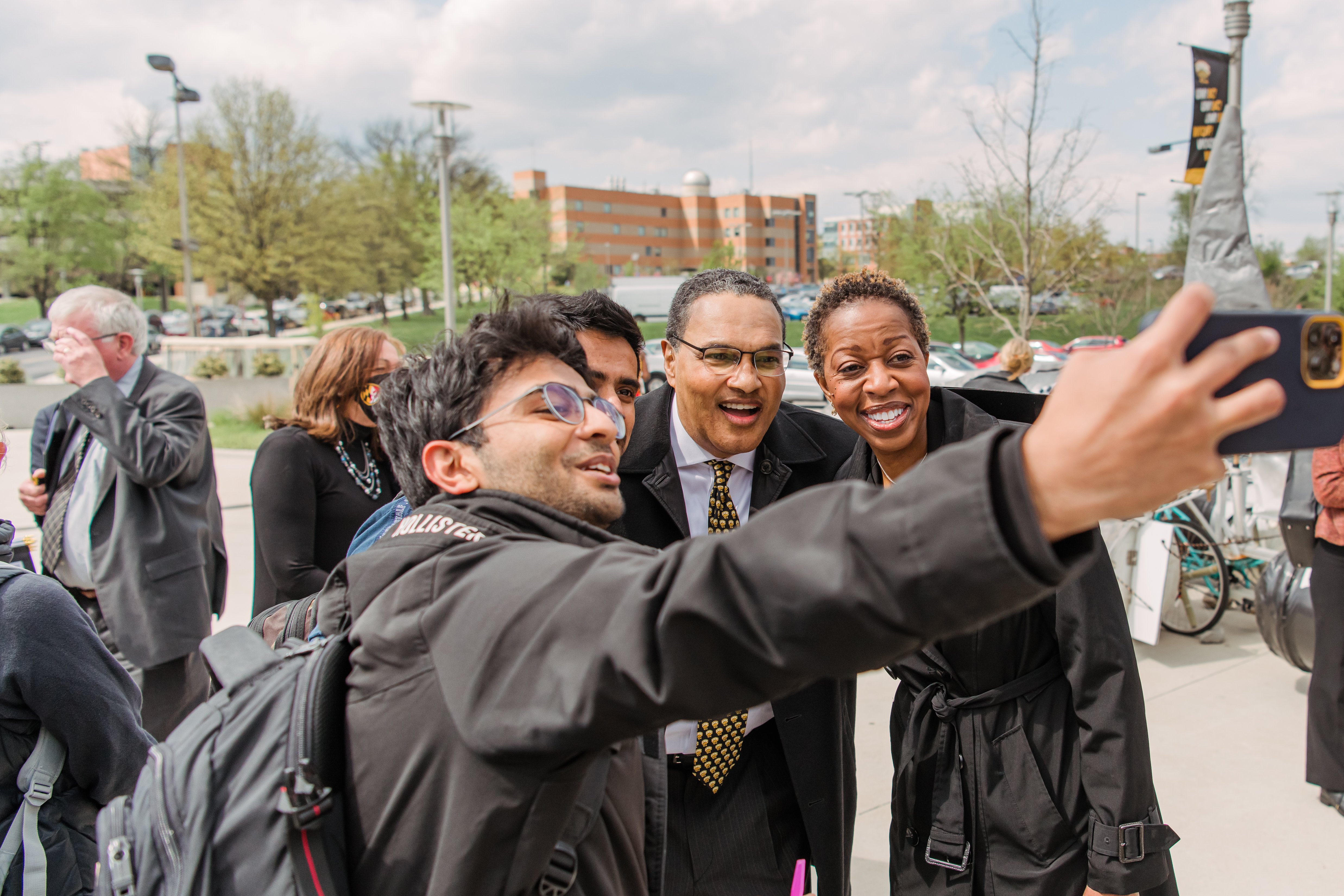You have /5 articles left.
Sign up for a free account or log in.

Freeman Hrabowski will retire June 30 after 30 years as UMBC’s president.
University of Maryland Baltimore County
Ever since he was a child in segregated Birmingham, Ala., Freeman Hrabowski has had a love for education.
As a boy, he found joy in solving math problems and voraciously read tomes of poetry and prose handed down by his parents—both teachers—who always emphasized the importance of education. The lessons he learned from them—as well as in segregated classrooms and Black churches fighting for change—shaped his ambitions to become an educator and ultimately led him to the University of Maryland Baltimore County, where Hrabowski has spent more than three decades as president.
The other guiding force in his childhood was activism. Navigating his own experiences with discrimination at a young age, Hrabowski found strength in the fight for equality gripping Birmingham. In the classroom and on the streets, Hrabowski sought a better life. And as the long-serving president of UMBC, he’s spent 30 years trying to change the lives of others through the transformative power of higher ed.
Now, as Hrabowski prepares to retire, he is looking back at his years as president and a lifetime of service. At the same time, he is peering ahead to what the future holds for UMBC and his successor.
The Man
Hrabowski was born into what he describes as Birmingham’s Black middle class. His parents both had an activist streak, though his father eventually left education to work in a steel mill for better pay. His mother was once fired from a nearby school district for leading protests demanding better pay for Black teachers before Birmingham hired her. Their belief in the value of education was passed down by their own parents.
Hrabowski grew up in a community that viewed education as a path to a better life, even in the face of segregation. His tattered schoolbooks were hand-me-downs from white schools, but nevertheless, he absorbed their contents as well as the lessons imparted by his parents and teachers.
“We were very fortunate to be taught two things. One, you have to be twice as good, because the world is not fair to children of color. And two, we should not allow others to define who we are,” he said.
A gifted student, Hrabowski finished eighth grade at age 11.
In 1963, when he was 12, he was arrested for participating in the Birmingham Children’s March, part of the civil rights movement. He vividly remembers being in church and hearing Martin Luther King Jr. encourage children to join the march.
“I spent five horrible days in jail,” Hrabowski said. “It was a defining moment.”
But the experience “did not beat us down,” Hrabowski said. “It taught us to be empowered.”
Importantly, King instilled the notion “that tomorrow can be better than today,” Hrabowski said. “But if it is to be, I must make it happen, I must be a part of the solution, I must be empowered.”
Those lessons became part of his leadership philosophy—principles he still draws on a lifetime later.
Hrabowski also had a taste of integration in his youth when his parents briefly sent him to Massachusetts, where he studied at an all-white school. While he appreciated the rigorous education, he was shunned by fellow students and teachers.
When Hrabowski graduated from high school at 14, he was ready to head straight to college, but his parents held him back because of his age. They were intent on sending their son to Morehouse College, King’s alma mater, but he “rebelled” and applied to Hampton University in Virginia, graduating at 19 with a degree in math. He then went to graduate school at the University of Illinois at Urbana-Champaign.
“I was allowed to study broadly, to take courses across disciplines and take extra grad courses with particular professors,” Hrabowski said. “It was the first time that I was in a setting where many of my professors were white. But unlike the situation in Massachusetts, they were caring.”
It was in graduate school that Hrabowski asked the question that shaped the rest of his career.
“I decided to focus on the fundamental question, what can we do to get more Americans, particularly of color, to succeed in STEM?” Hrabowski said.
After asking that question some 50 years ago, Hrabowski has been working on the answer ever since.
The Legacy
When Hrabowski joined UMBC as vice provost in 1987, he already had years of teaching and administrative experience. He had worked as a math professor and in various administrative roles at the University of Illinois, Alabama A&M University and Coppin State College.
In 1988, several years before he ascended to the UMBC presidency, Hrabowski co-founded the Meyerhoff Scholars Program with philanthropist Robert Meyerhoff, which would eventually lead to UMBC being recognized as a top institution for STEM achievement, particularly among Black students. Today UMBC is recognized for graduating more Black students who go on to earn Ph.D.s in the natural sciences and engineering than any other U.S. college or university.
Even so, Hrabowski likes to point out that UMBC does well in sending graduates of all races on to graduate school or into the STEM workforce.
In 1992, Hrabowski was named president of UMBC. Established in 1966, when Hrabowski was a teenager working toward a degree from Hampton, UMBC was the first public college in Maryland to welcome all races.
“Those of us founded in the ’60s represent an experiment in 20th-century American higher education,” Hrabowski said. “The question has been, can you bring people of all races together, and have them learn how to study together, compete against each other and get to know each other as human beings? The experiment continues today. We still have a long way to go.”
 Hrabowski described the UMBC of his early days as “an institution that had very high academic standards” but one where “a number of students were not succeeding, especially in science and engineering, and people thought that it was Black students, but it was students in general.”
Hrabowski described the UMBC of his early days as “an institution that had very high academic standards” but one where “a number of students were not succeeding, especially in science and engineering, and people thought that it was Black students, but it was students in general.”
When the Meyerhoff Scholars Program was first introduced, it focused on Black men. Eventually, UMBC expanded the program and, according to the university, it now enrolls about 50 new students a year, offering them four-year merit scholarships contingent upon earning a B average in a science or engineering major and completing various other requirements. While the program is credited with advancing successful STEM majors at UMBC and has been replicated elsewhere, other strategies have contributed to positive student outcomes.
Over the years, UMBC has focused on data-driven efforts to identify at-risk students and provide them with needed support, redesigned introductory classes that had a tendency to push students out of STEM majors, and increased retention efforts for freshmen, among other strategies aimed at getting students to graduation day. By doing so, Hrabowski says that UMBC has eliminated the Black-white racial gap in its graduation rates.
Hrabowski believes that UMBC’s success can show other higher education institutions what’s possible—even at public universities with far fewer resources than the STEM giants.
“We make assumptions about people who go to different types of institutions. And we know that the most privileged of Americans will go to the most privileged and the wealthiest of places with billions of dollars, and I’m very proud and happy for them. But it is a wonderful American story when working- and middle-class people of all races can come to a middle-class campus and become the best in the world,” Hrabowski said. “That’s what we’re talking about here. That’s the message for Americans: you don’t have to be rich to become the very best.”
As UMBC’s vice provost for enrollment management and planning, Yvette Mozie-Ross has shared that message with prospective students for more than three decades. Mozie-Ross was a senior at UMBC when Hrabowski arrived on campus. In 1989, she went to work for her alma mater; Hrabowski is the only boss she’s ever known.
“I’ve been working for the same boss for 33 years. I don’t know how many people can say that,” Mozie-Ross said. “It’s unique in this day and age. It’s been a special relationship.”
It’s not surprising, then, to hear Mozie-Ross echo her boss and mentor.
“People think you have to either come from wealth or you have to go to a very elite school in order to produce extraordinary people. He’s shown that you can do it with limited resources,” Mozie-Ross said.
The Successor
With Hrabowski’s retirement officially set for June 30, UMBC has tapped Valerie Sheares Ashby, a chemistry professor and dean of the Trinity College of Arts & Sciences at Duke University, to be his successor.
Sheares Ashby considers Hrabowski a mentor. She noted that years ago, during a conversation in the office she’ll soon occupy, he told her she would one day be a college president—a prediction she considered unlikely.
“At that time, I wasn’t even the department chair,” she said.
A search firm contacted her and asked her to apply, which she said surprised her because she was unaware of Hrabowski’s retirement plans.
Then she thought, “Who follows Coach K?”—a reference to legendary Duke men’s basketball coach Mike Krzyzewski, who recently retired. Hrabowski, like Coach K, has a long history of success and has turned down multiple job offers, so perhaps it’s only appropriate for a Duke administrator to compare the two.
Not to be intimidated, Sheares Ashby looked into the opening and quickly became intrigued.
“I knew of Freeman’s work, of course, and I know Freeman. I highly respect the values and vision of the university, so I said, ‘OK, I’ll look. But I don’t think I’m going to do this.’ I started the process and, literally, in the very first conversation, I thought, ‘Oh my goodness. These are my people. This is my vision, a vision that I’m so inspired by.’ I think that they’re doing what they do better than anybody else in the country. And at this time in my career, it felt like the right fit,” she said.
UMBC’s vision is articulated in a bold statement online: “Our UMBC community redefines excellence in higher education through an inclusive culture that connects innovative teaching and learning, research across disciplines, and civic engagement. We will advance knowledge, economic prosperity, and social justice by welcoming and inspiring inquisitive minds from all backgrounds.”
“Who doesn’t want to wake up every day and do that?” Sheares Ashby said.
 Despite her ties to Hrabowski, Sheares Ashby said she didn’t contact him about the search.
Despite her ties to Hrabowski, Sheares Ashby said she didn’t contact him about the search.
“We didn’t talk about it at all,” she said. “And I wanted to do that just to give him the respect of not doing anything that would cause the process to be questioned. If it was the right fit for me, it was the right fit for me, period. I just wanted to keep that process as clean as possible.”
Informed of her hire, Hrabowski said he was delighted by the news and shared a string of compliments to describe Sheares Ashby: brilliant, people-oriented, visionary, joyful and so on.
“Her credentials and her rich experience could have allowed her to go anywhere in the country and be a president anywhere in the country, public or private, but she chose to come to UMBC,” Hrabowski said.
Sheares Ashby said it’s a privilege to follow a leader as transformative as Hrabowski, and she doesn’t plan to deviate from the principles and values he’s established. At the same time, she hopes to make the job her own and has no desire to be Hrabowski 2.0.
“I do not walk around thinking about how I can fill Freeman’s shoes, because that’s not actually my job,” she said. “My job is to be the best leader that I can be for this institution going forward.”
Mozie-Ross, from the admissions office, said she isn’t expecting the new president to be a copy of Hrabowski, and neither should the UMBC community.
“I would hope that we allow her to bring her own strengths and talents to this work. I think she’s going to be amazing in her own right. And I hope that we will allow her that,” Mozie-Ross said. “I just want us to give her that opportunity to make her own way, to put her own stamp on things.”
The Next Step
Even after Hrabowski retires as president, he’ll still keep a foothold in higher ed.
His ongoing responsibilities will include staying engaged with his namesake Hrabowski Scholars Program through the Howard Hughes Medical Institute, a recently launched $1.5 billion initiative that aims to advance diversity in the sciences. He’ll also continue to develop the next generation of college leaders through his ongoing work with the Harvard Seminar for New Presidents, where he’ll keep doling out advice on how to advance the mission of higher education.
“What I say to new presidents in the Harvard [seminar] is there’s nothing more important than being truthful, No. 1. And, No. 2, when you make a mistake, own it. And, No. 3, be humble enough to ask for help,” Hrabowski said.
And with the value of higher education regularly called into question amid soaring costs and culture clashes, Hrabowski said leaders must demonstrate its worth and keep hope alive in the face of cynicism.
“We must be hopeful; we must help our students to put history in perspective. And even though this may be a dark period in some ways, we’ve had dark periods before. And we finally start to see the light. Education helps us to come back to the light,” Hrabowski said. “We cannot give up on our country and on humankind. The worst thing we can do is be cynical; it doesn’t help a thing. We must be honest about the problems, but we must focus on what we can do to make tomorrow better and believe in ourselves and in the power of higher education to transform lives.”








